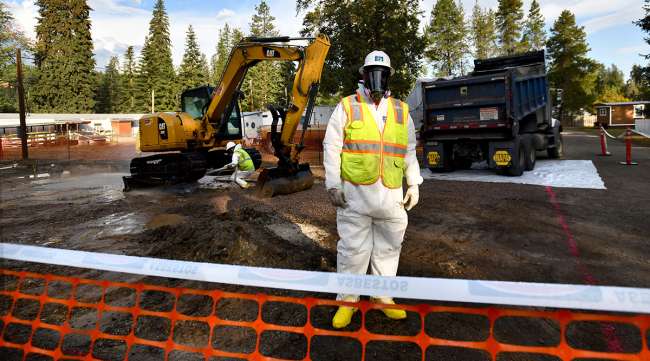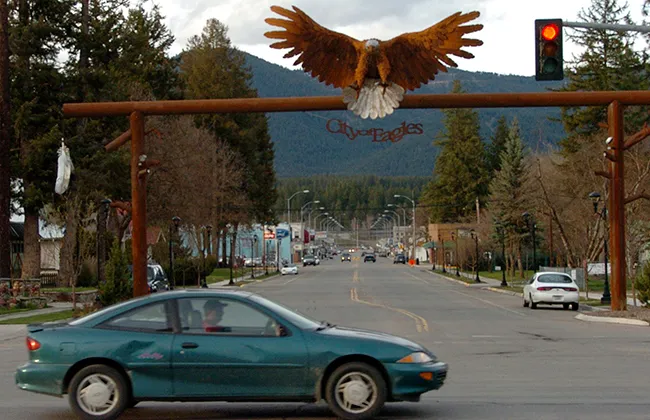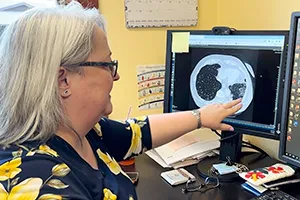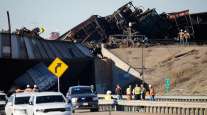Associated Press
Jury Finds BNSF Contributed to Two Asbestos Deaths

[Stay on top of transportation news: Get TTNews in your inbox.]
HELENA, Mont. — A federal jury on April 22 said Warren Buffett’s BNSF Railway contributed to the deaths of two people who were exposed to asbestos decades ago when tainted mining material was shipped through a Montana town where thousands have been sickened.
The jury awarded $4 million each in compensatory damages to the estates of the two plaintiffs, who died in 2020. The jury did not find that BNSF acted intentionally or with indifference, so there will be no punitive damages awarded.
Attorneys for the estates of the two victims had argued that the railroad, owned by Buffett’s Berkshire Hathaway conglomerate, knew the asbestos-tainted vermiculite was dangerous but failed to act.
BNSF said its employees didn’t know the vermiculite they hauled over decades from a nearby mine was filled with hazardous microscopic asbestos fibers.
The case in federal civil court over the two deaths was the first of numerous lawsuits against the Texas-based railroad corporation to reach trial over its past operations in the town of Libby. Current and former residents of the small town near the U.S.-Canada border want BNSF held accountable, accusing it of playing a role in asbestos exposure that health officials say has killed several hundred people and sickened thousands.
The railroad said it was obliged under law to ship the vermiculite, which was used in insulation and for other commercial purposes, and that W.R. Grace employees had concealed the health hazards from the railroad.
BNSF attorney Chad Knight said the railroad could only be held liable if it could have foreseen the health hazards of asbestos based on information available decades ago when the alleged exposures happened.
“In the ’50s, ’60s and ’70s, no one in the public suspected there might be health concerns,” Knight said April 19.

The entrance to downtown Libby, Mont., is seen in April 2011. (Matthew Brown/Associated Press)
The plaintiffs argued that BNSF higher-ups knew for decades that the vermiculite contained asbestos and that concerns about workers breathing asbestos dust had existed in medical journals since the late 1890s.
“We’re here to make a party that accepts zero responsibility accept an appropriate amount of responsibility,” plaintiffs’ attorney Mark Lanier said in his closing statement. “This is the fault of the bigwigs in the corporate office.”
The judge instructed the jury it could only find the railroad negligent based on its actions in the Libby Railyard, not for hauling the vermiculite.
BNSF was formed in 1995 from the merger of Burlington Northern railroad, which operated in Libby for decades, and the Santa Fe Pacific Corporation.
Berkshire Hathaway, based in Nebraska and chaired by Buffett, acquired BNSF in 2010.
Looming over the proceedings was W.R. Grace, which operated a mountaintop vermiculite mine 7 miles outside Libby until it closed in 1990. The Maryland-based company played a central role in Libby’s tragedy and has paid significant settlements to victims.

Dr. Lee Morissette shows an image of lungs damaged by asbestos exposure, at the Center for Asbestos Related Disease, April 4 in Libby, Mont. (Matthew Brown/Associated Press)
U.S. District Court Judge Brian Morris referred to the chemical company as “the elephant in the room” during the BNSF trial and reminded jurors repeatedly that the case was about the railroad’s conduct, not W.R. Grace’s separate liability.
Federal prosecutors in 2005 indicted W. R. Grace and executives from the company on criminal charges over the contamination in Libby. A jury acquitted them following a 2009 trial.
The Environmental Protection Agency descended on Libby after 1999 news reports of illnesses and deaths among mine workers and their families. In 2009 the agency declared in Libby the nation’s first public health emergency under the federal Superfund cleanup program.
The pollution in Libby has been cleaned up, largely at public expense. Yet the long time frame over which asbestos-related diseases develop means people previously exposed are likely to continue getting sick for years to come, health officials say.
The seven-member federal jury had been instructed to decide if the railroad was at fault in the deaths and if so, the amount of damages to award to their estates. A separate proceeding would be needed to determine the amount of any punitive damages.
A second trial against the railroad over the death of a Libby resident is scheduled for May in federal court in Missoula.
Want more news? Listen to today's daily briefing below or go here for more info:




